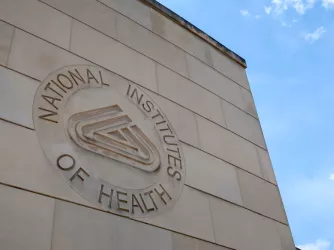Table of Contents
FIRE calls on University of San Diego Law to cease investigating professor for criticizing Chinese government

University of San Diego School of Law is investigating law professor Tom Smith for a post on his personal blog, in which he referred to individuals who believe that the coronavirus did not come from a lab in Wuhan as “swallowing a whole lot of Chinese cock swaddle.”
On March 10, Smith posted on his personal blog an excerpt from a Wall Street Journal article about the theory that COVID-19 originated in a lab in Wuhan. He then added his own commentary, stating:
If you believe that the coronavirus did not escape from the lab in Wuhan, you have to at least consider that you are an idiot who is swallowing whole a lot [sic] of Chinese cock swaddle. At least Peter Daszak has good personal and financial reasons, not to mention reasons of career preservation, for advancing what he must know is a facially implausible thesis. But whatever. Go Science!
On March 17, USD Law Dean Robert Schapiro sent an email to the law school community denouncing Smith’s blog post and stating that the university’s policies “specifically prohibit harassment, including the use of epithets, derogatory comments, or slurs based on race or national origin, among other categories.” He also said there would be a “process of review” to determine whether university policies had been violated.
In response to Schapiro’s statement and a phone call with Schapiro, during which Smith was told that he was being investigated and possible punishment could include termination, Smith amended his blog post, adding:
UPDATE: It appears that some people are interpreting my reference to “Chinese cock swaddle,” as a reference to an ethnic group. That is a misinterpretation. To be clear, I was referring to the Chinese government.
FIRE wrote to USD Law yesterday to explain that the law school’s investigation into Smith violates its promise of academic freedom to its professors and has caused a chilling effect among other faculty members at the law school. Smith’s blog post constitutes protected extramural expression and cannot be punished without USD Law thwarting its commitments to its faculty.
Institutions would be wise to carefully navigate issues surrounding faculty speech critical of foreign governments, including China, and to avoid giving the impression that they are willing to punish such speech.
“[W]hether speech is protected is ‘a legal, not moral, analysis,’” our letter said, “and Smith’s blog does not fall into an unprotected category of speech, as there is no exemption for speech on the basis that others find it disagreeable, offensive, or outrageous.”
As stated in our letter, FIRE has been contacted by a number of USD Law faculty who are concerned about the investigation of Smith’s speech. One faculty member made clear that his own speech has been chilled by the law school’s response to Smith’s extramural expression.
USD’s policy manual adopts the American Association of University Professors’ 1940 Statement of Principles on Academic Freedom and Tenure. The 1940 Statement includes an affirmation that when faculty “speak or write as citizens, they should be free from institutional censorship or discipline.” This promise to USD’s faculty has been directly violated by the law school investigating Smith for his personal blog post. Although USD is a Catholic university, the policy manual also states that “the University imposes no religious limitations on academic freedom.”
Student organizations, specifically the Asian Pacific American Law Student Association and the USD School of Law Student Bar Association, are calling on USD Law to fire Smith. APALSA wrote a letter to Smith, requesting an apology for his blog post and expressing that Smith should be held to the same standard of “professionalism” as students.
Institutions would be wise to carefully navigate issues surrounding faculty speech critical of foreign governments, including China, and to avoid giving the impression that they are willing to punish such speech. Chinese government bodies, including local consulates, have previously been involved in attempts to shut down government critics and will likely be encouraged to continue such efforts if their success appears likely.
For example, at the University of California, San Diego in 2017, the Chinese Students and Scholars Association at UCSD called for the cancellation of the Dalai Lama’s commencement address, seeking guidance from the Chinese consulate in its efforts. Just three months after the Dalai Lama delivered the address, UCSD was told that the China Scholarship Council, which is part of the Chinese Ministry of Education, would no longer process applications for visiting scholars to come to UCSD. And in 2019, the CSSA at Canada’s McMaster University invoked the local Chinese consulate in an email to administrators calling for censorship of political speech after student groups invited a Uighur activist to campus.
To be clear, there is no evidence we’ve seen that such interference occurred at USD Law. But it is an unfortunate reality universities must guard against in similar circumstances. Put simply: If universities give the impression that they will punish speech critical of China, Chinese authorities may seek to take advantage of it.
USD Law’s decision to investigate Smith is an impermissible outcome at a university that guarantees its professors academic freedom. FIRE calls on the law school to end its investigation into Smith and reaffirm to its faculty that their academic freedom rights will be protected.
FIRE defends the rights of students and faculty members — no matter their views — at public and private universities and colleges in the United States. If your rights are in jeopardy, get in touch with us: thefire.org/alarm.
Recent Articles
FIRE’s award-winning Newsdesk covers the free speech news you need to stay informed.

Maine’s censure of lawmaker for post about trans student-athlete is an attack on free speech

Trump’s border czar is wrong about AOC

FIRE calls out 60 Minutes investigation as 'political stunt' in comment to FCC
